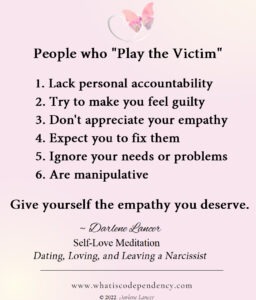
Mental Health & Relationships: Is Someone “Playing the Victim”?
By Darlene Lancer, JD, MFT
“Playing the Victim”
Not all victims are manipulative. Feeling like a victim has taken on negative connotations, but there are people who ”play the victim” in order to manipulate you. This is a favorite defense of narcissists and other personality-disordered people. In some other instances, this behavior is learned as a child because as a way to get needs met. I refer to them here as “actors.” Sometimes, actors act consciously and more often it’s unconscious and automatic, like most of our defense mechanisms.
Codependents and empaths with poor boundaries are easily manipulated and can end up in long-term relationships with a narcissist or someone who uses this tactic. They suffer from guilt and blame, hurt and resentment that their needs and feelings aren’t being considered.
The Signs of “Actors”
Here are some signs you’re being played by an actor:
- They don’t take responsibility. When we feel like a victim, we externalize the source of our pain, so we’re not accountable. Narcissists never want to take responsibility because it tarnishes their image of perfection, which is really all a defense to hidden
- They try to shift the blame to you — anything to not take responsibility for their own mistakes or shortcomings. When you first meet a narcisisst notice if they blame other people. Soon you’ll be on their hit list. If they can make you feel guilty, they can gain power over you, which is what they want. The bonus is that you relieve their shame. You’re not responsible for other people’s feelings, much less their actions and words.
- They don’t take in your care and compassion. They have to keep up the complaining and victimhood act for more attention. They want power and attention more than sympathy. A real victim will appreciate your concern, and it usually uplifts them and can enable them to take self-directed action.
- They often try to get you to do something to fix their pain. This is a fool’s errand, because even if you were able to, which you’re not, they won’t appreciate it. Their need for narcissistic supply is bottomless. Remember, they’re invested in being the victim. They can’t credit you for your success, because they want all the praise and sympathy.
- They’re solely focused on their problems and minimize or ignore your needs and feelings. What they want is your attention, and don’t want to get side-tracked by focusing on you or their children.
- They’re master manipulators. Often their manipulation is covert, like when they play the victim. Notice subtle put-downs and how they deftly avoid answering questions about their behavior and shift responsibility for problems and your complaints to you.

Moving Forward
Playing the victim is only one of many defenses and tactics that abusers and narcissists use. There are many ways to manipulate. Learn to spot them all and how to respond effectively in Dating, Loving, and Leaving a Narcissist: Essential Tools for Improving or Leaving Narcissistic and Abusive Relationships.
Start giving yourself the empathy you deserve, and set boundaries with manipulators.
© 2022 Darlene Lancer
This piece was originally published here, and is republished with the author’s kind permission.
Darlene Lancer is a Licensed Marriage and Family Therapist and expert on relationships and codependency. She’s the author Conquering Shame and Codependency: 8 Steps to Freeing the True You and Codependency for Dummies and six ebooks, including: 10 Steps to Self-Esteem, How To Speak Your Mind – Become Assertive and Set Limits, Dealing with a Narcissist: 8 Steps to Raise Self-Esteem and Set Boundaries with Difficult People and Freedom from Guilt and Blame – Finding Self-Forgiveness, also available on Amazon. Ms. Lancer has counseled individuals and couples for 30 years and coaches internationally. She’s a sought after speaker in media and at professional conferences. Her articles appear in professional journals and Internet mental health websites, including on her own, www.whatiscodependency.com, where you can get a free copy of “14 Tips for Letting Go.”




